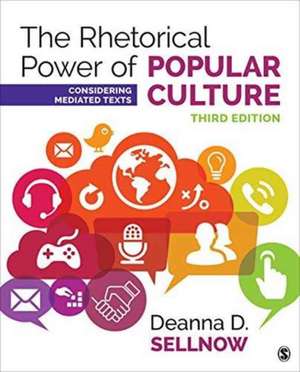The Rhetorical Power of Popular Culture: Considering Mediated Texts
Autor Deanna D. Sellnowen Limba Engleză Paperback – 10 mai 2017
Preț: 714.87 lei
Preț vechi: 979.27 lei
-27% Nou
136.78€ • 142.83$ • 112.96£
Carte tipărită la comandă
Livrare economică 15-29 aprilie
Specificații
ISBN-10: 1506315216
Pagini: 344
Dimensiuni: 187 x 232 x 13 mm
Greutate: 0.52 kg
Ediția:Third Edition
Editura: SAGE Publications
Colecția Sage Publications, Inc
Locul publicării:Thousand Oaks, United States
Recenzii
Cuprins
Preface
Acknowledgments
CHAPTER 1. WHAT IS POPULAR CULTURE AND WHY STUDY IT?
What Is Popular Culture?
What Are Popular Culture Texts?
Why Study Popular Culture?
Conducting Rhetorical Analyses of Popular Culture Texts
Sample Student Essay
Summary
Challenge
Suggested Readings
References
CHAPTER 2. EXPANDING THE RHETORICAL TRADITION
The Nature of Rhetoric and Rhetorical Criticism
Evolution of the Rhetorical Tradition
The Neo-Aristotelian Approach to Rhetorical Criticism
New (Contemporary and Postmodern) Rhetorical Approaches
Sample Student Essay
Summary
Challenge
Suggested Readings
References
CHAPTER 3. A NARRATIVE PERSPECTIVE
Narration
Narrative Rationality
Conducting a Narrative Analysis
Sample Student Essay
Summary
Challenge
Suggested Readings
References
CHAPTER 4. A DRAMATISTIC PERSPECTIVE
The Dramatistic Life Cycle
Cluster Analysis
The Pentad
Conducting a Dramatistic Analysis
Sample Student Essays
Summary
Challenge
Suggested Readings
References
CHAPTER 5. A SYMBOLIC CONVERGENCE PERSPECTIVE
Fantasy Theme Analysis
Rhetorical Visions, Master Analogues, and Life Cycles
Conducting a Symbolic Convergence Analysis
Sample Analysis
Sample Student Essays
Summary
Challenge
Suggested Readings
References
CHAPTER 6. A NEO-MARXIST PERSPECTIVE
Ideology and Hegemony
Materialism and Economic Metaphors
Sites of Struggle
Conducting a Neo-Marxist Analysis
Sample Student Essays
Summary
Challenge
Suggested Readings
References
CHAPTER 7. FEMINIST PERSPECTIVES
Hegemony
Sites of Struggle
Waves of Feminism
Feminist Perspectives
Conducting a Feminist Analysis
Sample Student Essays
Summary
Challenge
Suggested Readings
References
CHAPTER 8. A MUSIC PERSPECTIVE: THE ILLUSION OF LIFE
Music as Rhetoric
The Illusion of Life
Conducting an Illusion of Life Analysis
Sample Student Essays
Summary
Challenge
Suggested Readings
References
CHAPTER 9. VISUAL PERSPECTIVES
History and Nature of Visual Communication
Visual Theory Perspectives
Visual Pleasure Theory
Conducting a Visual Pleasure Analysis
Sample Student Essay
Summary
Challenge
Suggested Readings
References
CHAPTER 10. MEDIA-CENTERED PERSPECTIVES
Media Ecology Theory
Media Logic
Social Learning Theory
Parasocial Relationship Theory
Cultivation Theory
Conducting an Analysis Using a Media-Centered Perspective
Sample Student Essay
Summary
Challenge
Suggested Readings
References
Appendix. Writing a Popular Culture Rhetorical Essay
Glossary
Index
About the Author
Notă biografică
Deanna D. Sellnow is a professor of strategic communication in the Nicholson School of Communication and Media at the University of Central Florida. She conducts research in two major areas. The first focuses on strategic instructional communication in a variety of contexts including both in-person and online classrooms, as well as risk, crisis, and health communication contexts. The second focuses on rhetorical studies of popular culture (ranging from music to advertisements to television programs and feature films). She has conducted funded research for the World Health Organization (WHO), the U.S. Geological Survey (USGS), the U.S. Department of Agriculture (USDA), the U.S. Department of Homeland Security (DHS), the National Oceanic and Atmospheric Administration (NOAA), and the U.S. Centers for Disease Control and Prevention (CDC). Her work is published in refereed national and international journals, as well as several books. She has presented her work across the United States and in many countries around the world, including Canada, China, Denmark, Egypt, England, Germany, Hong Kong, India, Indonesia, Ireland, Italy, Japan, Senegal, Singapore, Spain, Sweden, Türkiye, and Vietnam. She and her husband, Tim, have a daughter (Debbie) and son-in-law (Scott), son (Rick) and daughter-in-law (Sarah), and three grandchildren (Lincoln, Emmett, and Rosemary).
Descriere
This book is a step-by-step introduction to rhetorical theory and criticism by focusing on the powerful roles TV programs, advertisements, music, comics, and movies play in persuading us on what to believe and how to behave.
